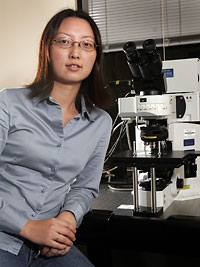UC Berkeley Web Feature
UC Berkeley's MacArthur fellows
Life at the synapse
Lu Chen, assistant professor of neuroscience and of molecular and cell biology
20 September 2005
Synapses allow nerve cells to talk to one another, and thus, in the brain, are critical to memory and learning. Chen has developed an innovative technique for studying the way synapses form at the junction between nerve cells. Co-opting featureless, non-neural cells emptied of most of their contents, she fills them with proteins thought to be important in synapse formation and looks at how these cells interact with live nerve cells.
 Lu Chen (MacArthur Fellowship photo) |
This recent work has shown that perhaps four separate proteins, including a type of glue molecule that makes nerve cell membranes stick together, are enough to make a rudimentary synapse –one that senses the pre-synaptic release of a neurotransmitter and responds with an electrical signal.
"The idea right now is to first understand how to make a rudimentary synapse," Chen said. "We have a system now that is pretty close. Then we can put in other proteins – regulatory or plastic molecules – to see what they do.
"The advantage of our system is that we know all the components and protein interactions, so when you have some changes, it's easier to interpret results than if we were doing the same thing with a real synapse with hundreds of unknown interactions."
In her new campus laboratory, which she moved into last week, she plans to work with this simplified system to determine the specific roles of the many other proteins thought to be involved in the formation of the synapse. This work could have implications for numerous neurological or psychiatric diseases.
Chen was born in Wuxi, Jiangsu province, China, several hundred miles west of Shanghai. She attended the University of Science and Technology of China in Hefei, graduating in 1993 with a B.S., and completed her Ph.D. in 1998 at the University of Southern California. After post-doctoral fellowships at USC and UCSF, she joined the UC Berkeley faculty in 2003. Last month, she received one of only four $1 million, five-year research awards from the W. M. Keck Foundation, part of the foundation's 2005 Distinguished Young Scholars in Medical Research program. Last year, she was awarded a prestigious Packard Fellowship for Science and Engineering from the David and Lucile Packard Foundation.
Chen is a former college volleyball player and now an avid ping pong and badminton player. She lives in Berkeley with her husband, Shaowen Bao, a UC Berkeley adjunct assistant professor of neuroscience.
Related links:
- Lu Chen's home page
- Signaling Brain Cells (from Science Matters)

